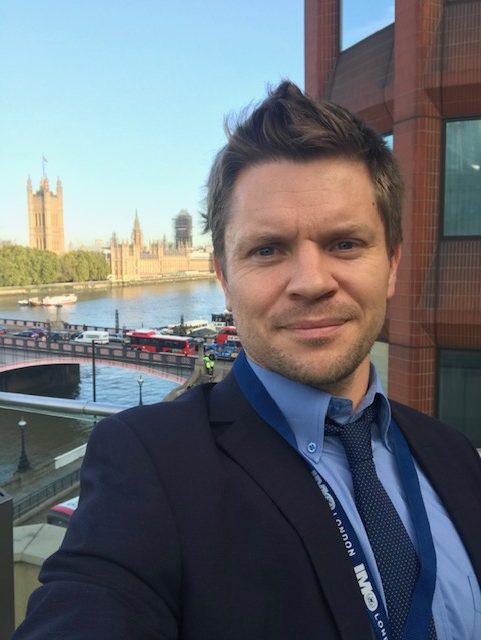
CV
(publications, Teaching, Work)
Curriculum vitae, including information about the author of the book; “Enforcing International Maritime Legislation on Air Pollution through UNCLOS”, specialized skills obtained from parttime teaching law of the sea as associated professor while working fulltime professionally with UNCLOS and IMO (MARPOL, PSC, GHG) for years at different authorities.
Publications
- Book; “Enforcing International Maritime Legislation on Air Pollution through UNCLOS” (ISBN 9781509927784). Hart Publishing, Oxford. (2019)
(Available here: Bookshop
- Article: “Enforcement of the 2020 sulphur limit for marine fuels: Restrictions and possibilities for port States to impose fines under UNCLOS. “Review of European, Comparative and International Environmental Law (RECIEL) (2019).
(Available here: https://onlinelibrary.wiley.com/doi/abs/10.1111/reel.12306) - Chapter contribution on MARPOL Annex VI: to the book “International Convention for the Prevention of Pollution from Ships: A Commentary” by Editors Henrik Ringbom and Aldo Chircop. (To be published late 2024/ early 2025)
Work CV
2017 – present: Senior Regulatory Manager of International Affairs at A.P. Møller-Mærsk
2016 – 2017: Special legal advisor with the Danish Maritime Authority
2012 – 2016: Head of section at the Danish Environmental Protection Agency
2010 – 2012: Head of section at the Danish Pilotage Authority
2007 – 2010: Head of section at the Danish Working Environment Authority
Teaching CV
2021 – present: Associated professor and censor in ”International Law” at Copenhagen University, Institute of Law
(See webpage from Copenhagen University’s Faculty of Law:
https://forskning.ku.dk/soeg/result/?pure=da%2Fpersons%2Fjesper-jarl-fanoe(1ce57108-ad25-43e4-9896-6c3eea939130)%2Fpublications.html)
2012 – 2020: External teacher and censor in ”International Law” at Copenhagen University, Institute of Law
2014 – 2017: External teacher and censor in ”EU Law” at Copenhagen University, Institute of Law
Interview and presentations
Interview on enforcement of IMO emission regulations through UNCLOS:
https://shipandbunker.com/news/world/398361-trident-alliance-warns-shipowners-against-fonar-use-where-mgo-is-available
Presentation at Copenhagen University on enforcement of an IMO Fuel Standard through UNCLOS:
https://www.linkedin.com/feed/update/urn:li:activity:7200876061033664512/
Presentation at Copenhagen University on UNCLOS in the Artic with focus on emissions :
https://www.linkedin.com/feed/update/urn:li:activity:6905546265221025792/
Professional Journey
The idea for my book, ‘Enforcing International Maritime Legislation on Air Pollution through UNCLOS’, began in 2014 during my tenure at the Danish Environmental Protection Agency (EPA). There, I worked on implementing MARPOL Annex VI and the EU Sulphur Directive, which set a global 0,5% sulphur limit and a 0.1% SECA limit for most European waters, into Danish law.
My efforts continued in collaboration with the Danish Maritime Authority (DMA), Danish Attorney-General, and public prosecutors as part of a national emission enforcement Task Force, focusing on enforcing the 0.1% sulphur limit.
From early 2016 to late 2017, I worked at the DMA on port state control (PSC) for MARPOL Annex VI and participated in a national enforcement task force on enforcing emission violations, e.g. of Annex VI, with public prosecutors, district attorney and police. A task forced focused on breaching the gap between PSC imposed fines (often confined to a maximum) and fines imposed via prosecutors and court.
Following that, I joined A.P. Mølle-Mærsk as a Senior Regulatory Advisor in Public Affairs and International Legal Affairs, Energy Transition focusing on decarbonization, especially at the International Maritime Organization (IMO) level, both in relation to the initial IMO GHG-strategy but also the (at MEPC80) IMO revised GHG-strategy from 2023.
In 2014, I also began teaching parttime in International Law at Copenhagen University as an external teacher and censor. The course cover various topics, including the Law of the Sea (UNCLOS), Law of Treaties (VCLT), State Responsibility (ARSIWA), and State Jurisdiction, including universal jurisdiction and the principles of jus cogens and erga omnes. In 2021 I was made associated professor.
Research and Publications
My experiences at the EPA and DMA, including those obtained from the enforcement task force, along with my academic teaching, inspired me to write about the enforcement challenges related to prescribing dissuasive fines. A notable issue within Port State Control was the misconception that port States could not impose fines for emissions violations occurring outside their territory, including on the high seas, due to UNCLOS limitations.
My theory, now recognized and applied, asserts that Part XII of UNCLOS not only places obligations on flag States (e.g., Article 217) but also grants special jurisdictional rights to coastal and port States (e.g., Articles 220 and 218) for enforcement of IMO regulations. Especially Article 218 allows port States to enforce and sanction all violations of international maritime emission regulations, such as IMO regulations on GHGs under MARPOL Annex VI (EEDI, EEXI, CII), and future codified Fuel Standards per the revised IMO GHG Strategy. Additionally, Article 228.1 clarifies the overlapping jurisdiction between flag States (e.g. following Article 217) and port States (e.g. pursuant to Article 218.)
Moreover, my theory proposes that a future IMO ban on fossil fuels will attain jus cogens status within International Law for environmental protection. This would obligate all States to enforce violations through Universal Jurisdiction and be accountable under the principle of Erga Omnes, with State Responsibility under ARSIWA for any failure to do so.
You can read more about my book, Enforcing International Maritime Legislation on Air Pollution, here: Book About UNCLOS and order it here: Bookshop
You can also follow me on LinkedIn, X or reach out to me on email here: Contact
And thanks to my oldest daugther Esther for making this site following a school project on making sites.
